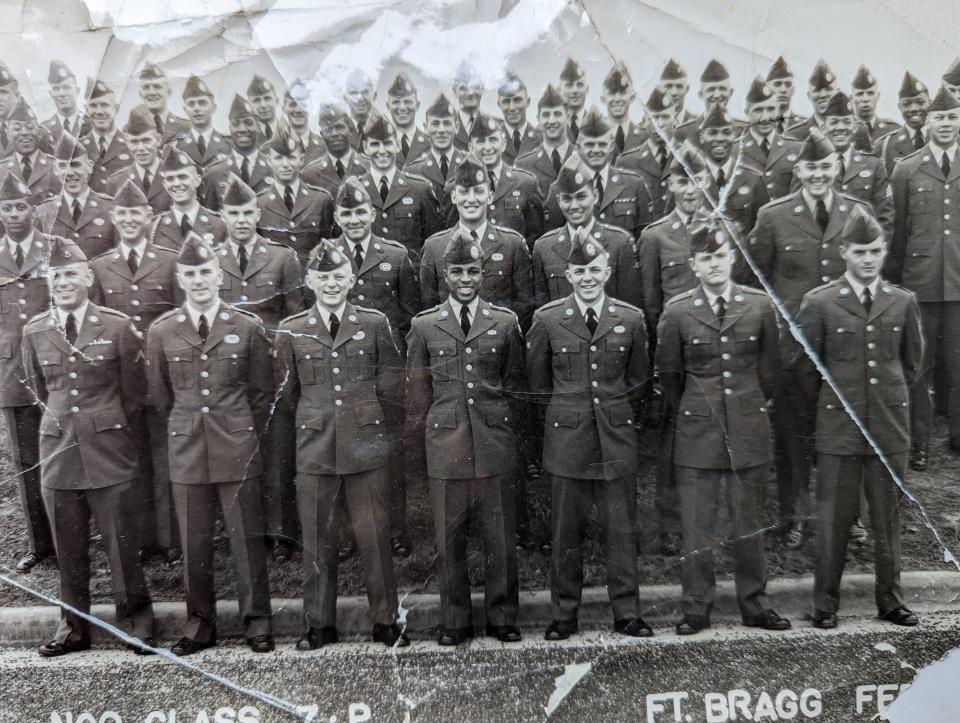Charita Goshay: People who attack their own country don't need to be honored
- Oops!Something went wrong.Please try again later.
Fort Bragg, North Carolina, is a big part of my family's story.
In the summer of 1959, my uncle Jon joined the Army, eventually becoming one of the first Black members of the famed 82nd Airborne.
Last month, the Pentagon changed the name of Fort Bragg to Fort Liberty, the former bestowed in 1918 to honor a Confederate general.
Despite the howls of "woke-ism," this is not an erasure of American history, but rather a correction of it.
"It was long overdue," my uncle says.

Changing names: These bases were named after Confederates, now titles may be ditched. Here's what vets say
Who was Fort Bragg named after?
A graduate of West Point, Braxton Bragg made a name for himself during the Mexican American War. He rode that fame to wealth as he and his wife owned a Louisiana plantation and 100 enslaved people. However, his return to military service in support of the insurrectionists during the Civil War proved disastrous. He's blamed for losing key battles that led to the Confederacy's undoing.
Given all the people who have served, defended, even died for this country, who thought it'd be a great idea to name an American military installment after someone who took up arms against America?
That used to be called treason.
It was part of the effort to perpetuate The Lost Cause, the notion that the Confederates' insistence on preserving slavery and white supremacy under the guise of states' rights was a moral and just crusade.
Confederate States of America Vice President Alexander Stephens said so in 1861:
"Our new government is founded upon exactly the opposite ideas; its foundations are laid, its cornerstone rests, upon the great truth that the negro is not equal to the white man; that slavery, subordination to the superior race, is his natural and moral condition. This, our new government, is the first, in the history of the world, based upon this great physical, philosophical, and moral truth."
History is hard to hear
Now, we know that ours is a culture that is notoriously allergic to history. News stories about our knowledge gap never fail to shock and surprise.
History can be hard to hear, but a narrative that is inaccurate is not history — it's just an argument waiting to happen.
History forces us to hear the truth about ourselves. Accepting that truth demands a measure of maturity.
When we refuse to do so, we get QAnon and Charlottesville.
Our history also reminds us there's no such thing as perfection among the people who make it. We've had impactful figures who were crooks, incompetents, bigots and hypocrites. They were a blend of virtues and flaws, just like the rest of us.
Do accomplishments outweigh faults?
The question has always been whether their accomplishments outweighed their faults.
Some of the men who started this wonder of a country were slave owners, all while knowing the institution was doomed. They upheld the practice out of their own selfishness.
President Franklin D. Roosevelt not only pulled America from the abyss of the Great Depression, he led the free world in defeating Nazism but did so with a segregated military. He also was an antisemite who had Japanese and some Italian Americans interned in camps for no reason other than their ethnicity.
Before his life was cut short, John F. Kennedy had all the markings of a brilliant president, but was reckless and compulsive in his private life, as was Bill Clinton, whose intellect is not up for debate.
During the Civil War, Abraham Lincoln suspended parts of the Constitution, and, some say, forgave the South much too easily.
No one was more qualified to be president than Richard Nixon but ... well ... you know.
The nature of our system is that our politics are all over the place. America's military is the one constant, the glue that holds it all together. It doesn't matter if you have the greatest country in the world if there is no one to protect and defend its principles. Plus, when it comes to change and growth, our military has always been ahead of the wider culture.
As a result, the names of 10 military forts are in the process of being changed. Fort Hood, originally named after John Bell Hood, a Confederate officer who fought — and lost — at Gettysburg, is now Fort Cavazos, honoring the Texas-born Gen. Richard Cavazos, the nation's first four-star Latino-American general.
My uncle's grandson William became an Army officer who served Fort Benning, Georgia, which is now Fort Moore, the first to honor a married couple. Lt. Gen. Harold G. Moore, successfully led troops during major battles in Vietnam. His wife, Julia, an advocate for military spouses and families, is credited for changing how the military notifies families about a combat death.
The base, built on a former plantation, was named for Confederate Brigadier Gen. Henry Benning.
History teaches us there are times and moments when the lines are clear: People who attack their own country don't deserve to be honored by it.
Charita M. Goshay is a Canton Repository staff writer and member of the editorial board. Reach her at 330-580-8313 or charita.goshay@cantonrep.com. On Twitter: @cgoshayREP
This article originally appeared on The Repository: Charita Goshay: Military bases needed to change names
